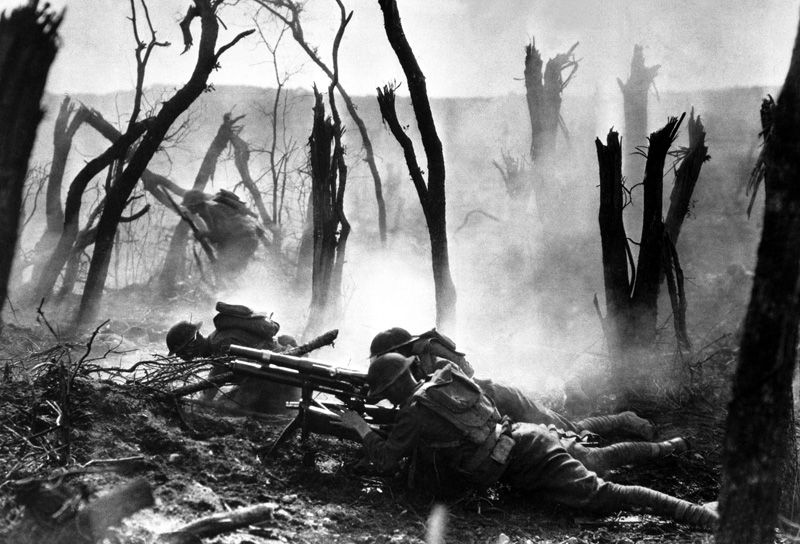The assassination of Archduke Franz Ferdinand on the streets of Sarajevo at the end of June 1914 was enough to spark a European military bloodbath of unprecedented dimensions. The murder, which was carried out by Serbian nationalists, started a domino effect of incredible proportions.
Austria-Hungary declared war on Serbia, Germany declared war on Russia and France, and Britain declared war on Germany as soon as the Germans invaded poor little Belgium. Soon most of Europe had been mobilised as the continent’s nations sent their sons off to the front line to a probable death in the sodden trenches or on the bloody, muddy battlefields.
However, the Danes chose not to mobilise their army. Denmark had no interest in taking part in the conflict and did everything possible to stay neutral. The Danish defeat to Prussia and Austria in 1864 had changed the Danish mentality, and by 1914 it was a predominantly defensive one that was modest about its military prowess. This was reflected in the military strategy, where the goal was simply to withstand siege until foreign aid arrived.
However, while Copenhagen had a number of fortifications, the progress of military technology and the increased range of artillery had left them too outdated and the city vulnerable to attack. So when 58,000 Danish reserves were called up, most of them were deployed to man Copenhagen’s fortifications, which were further boosted in 1915 by a new line between Køge and Roskilde.
Mining for trouble
Despite its neutrality, the Danish government viewed its aggressive southern neighbour as its biggest threat, and from the outset it decided to ‘keep its enemies closer’ − without ever actually allying itself to Germany. And it didn’t take long for the Germans to come calling with a ‘suggestion’ – more of an ultimatum really – in August 1914, just after Britain had declared war on Germany, to lay mines in its coastal waters. The Germans wanted to deter a potential British invasion through the Danish seas.
The pressure on the Danish leaders to lay the mines was enormous. The politicians agreed that any involvement in the Great War could mean the end of the already weakened Danish kingdom. The wounds from the defeat in 1864 were still fresh. On the other hand, how could they forget the British bombardment of Copenhagen in 1807, which left the proud capital crippled and hundreds of civilians dead. The bombardment had followed similar Danish attempts to stay neutral, while the strong European nations waged war on each other.
The Danish king, Christian X (1912-1947), who had a number of relatives in the British royal family, was against laying mines in the Danish seas, but was convinced otherwise by the navy chief, Vice-Admiral O Kofoed-Hansen, and in the end, the Danish government complied with the German demand. The Danes then telegrammed the Brits to inform them of their decision and hoped for the best. The British reply was simply: “Quite reasonable”. It left the Danes extremely relieved.
Business opportunity
Less than a week after the German ‘suggestion’, all of Storebaelt was mined. Parts of Oresund and Lillebaelt followed without British protests, despite the fact that Denmark, according to international law, was obligated to keep its seas open.
While the Danish government did what it could to stay out of the bloody mess that the World War was turning in to, some Danes saw an opportunity to make money – primarily by supplying the participating nations with products that they needed, but didn’t necessarily have the resources to produce.
The First World War is remembered as being the first war to be a business opportunity. Initially they thought it would be over by Christmas, but then it dragged on. Millions of soldiers were called up. Millions were killed. So millions more were called up.
Canned heat
Seldom had the world experienced armies of such great sizes. Worldwide, an estimated 65 million soldiers were mobilised. And they all needed to eat. And it wasn’t just in the trenches, as the two nations also battled it out at sea, where naval blockades and submarine warfare were part of the attempt to isolate and starve the opponent out.
So as the war put pressure on the two nations’ reserves, Denmark became both Britain and Germany’s bread basket. Danish agriculture boomed as large amounts of bacon, cheese, butter and livestock were exported to the two fighting nations. It wasn’t without risk though. Supply missions through dangerous seas led to 275 Danish vessels being sunk, claiming the lives of 722 sailors.
Canned food was in particularly high demand. The amount of Danish factories producing canned meat products exploded from 21 to 148 to meet a demand that had increased 50-fold since the start of the war.
The suppliers, who became known as the ’Goulash barons’, mainly sold to the German army. They favoured quantity over quality – so the tendons and guts were put to good use – and didn’t concern themselves too much with the source. In October 1915, a Copenhagen businessman with his eye on the pie bought three buffalos from Copenhagen Zoo and then swiftly sold them to a Goulash baron.
South Jutland returns
Nevertheless, Denmark’s military action record wasn’t entirely earned by delivering canned food.
As Denmark had lost vast parts of Jutland to Germany in 1864, a large Danish minority was under German rule in Schleswig and southern Jutland. Some 30,000 men in northern Schleswig with Danish backgrounds, therefore, fought for the Germans. Many of them were men from southern Jutland, who were conscripted, and approximately 3,900 of them died.
The German surrender finally came at 11am on the eleventh day of the eleventh month of 1918. Almost 10 million people had been killed – 4,622 of them Danish. As a result of the following peace agreement, a referendum was held regarding the Danish-German border that saw southern Jutland returned to Denmark.
Meanwhile, the positive experience of neutrality would come to affect Danish foreign policy for decades to come.
















